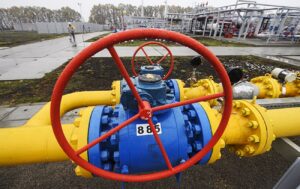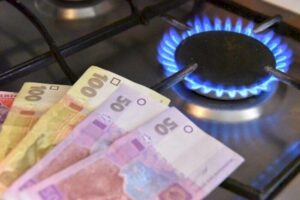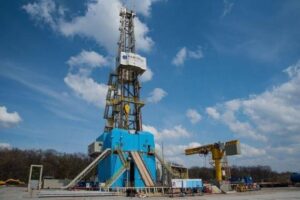
“Chernihivgaz” JSC has come under the management of “Naftogaz” Group, the company’s press service said on Tuesday.
“Chernihivgaz” became the 18th enterprise to come under state control.
The company delivers gas to almost 360,000 homes, regulates its distribution to budgetary and religious organizations, industrial facilities and municipal heating enterprises,
“Chernihivgaz” joined the “Naftogaz” Group as part of the transfer of gas distribution companies to state control. At present, personal accounts of customers, as well as tariffs for distribution services, remain unchanged”, the statement said.
As reported, at the end of May 2022, at the request of the State Bureau of Investigation (SBI), the court transferred the seized private corporate rights to 26 regional and city gas distribution system operators to the management of the ARMA.
In September 2022, “Naftogaz” of Ukraine registered Gas Distribution Networks of Ukraine LLC (“Gazomerezhi”), whose main activity is gas distribution through local pipelines.
By Resolution No. 1335 dated November 25, 2022, the Cabinet of Ministers transferred state-owned gas distribution networks to “Gazomerezhy” for operation.

In April and the first half of October 2023, GTS Operator LLC transported more than 3 bcm of natural gas from the EU and Moldova to Ukraine, which is seven times more than the volume of the resource transported during the same period last year (more than 414 mcm), the Energy Ministry reported.
Of the transported gas, 2.4 billion cubic meters of fuel belonging to foreign companies are stored in domestic UGS facilities, according to its release on Monday.
According to the GTSOU, cited by the Energy Ministry, the main transportation route remains the Slovakian one, with 45% of the gas volumes coming from there. Natural gas was also supplied from Hungary, Poland, and the Trans-Balkan route (from Romania via Moldova).
The Ministry of Energy noted that the Trans-Balkan route was used for the first time this year, mainly transporting gas ordered by foreign traders for storage in Ukraine.
As reported, natural gas supplies to Ukraine in September 2023 from the European Union and Moldova amounted to 982.7 bcm. In April-September 2023, Ukraine received more than 2.8 bcm from the EU and Moldova, which exceeds the corresponding figures for the same periods in 2021 and 2022.
As noted by Oleksiy Chernyshov, CEO of Naftogaz Group, the volume of non-resident gas in Ukraine’s underground storage facilities reached 2.2 bcm at the beginning of October.
Stress testing conducted by the Ukrainian GTS and UGS operators with the assistance of USAID in August 2023 confirmed the high reliability of the Ukrainian gas infrastructure, including the storage and transportation of gas from foreign customers, even in the face of military risk of damage to key assets.

Ukrgasvydobuvannya JSC has launched five more wells with a daily increase in production of 0.5 million cubic meters of natural gas, the company’s press service reports.
According to the press service, four of the five wells were drilled in “old” fields 45-55 years old. One more is a new field: gas from it first entered the Ukrainian gas transportation system this month.
“To achieve our production growth targets, we combine the use of modern technologies to discover new deposits at already depleted fields and increase investments in research and development of new areas,” said Oleg Tolmachev, Head of UGV.
This approach at one of the old fields has increased daily gas production by 35% over the past two years, and at another by almost 50%.
“The rest of the fields, thanks to the use of modern technologies, have received a new life – they demonstrate stabilization of indicators and the possibility of potential production growth,” the company said.
As reported, since the beginning of the year, UGV has commissioned 58 new gas wells with a total average daily production rate of 5.3 million cubic meters.
The company aims to increase natural gas production by 1 bcm in 2023 to 13.5 bcm. In 2022, UGV produced 12.5 bcm of natural gas (commercial), which is 3% less than in 2021.
NJSC Naftogaz of Ukraine owns 100% of Ukrgasvydobuvannya shares.

Ukraine is entering the autumn-winter season with a sufficient amount of gas in underground storage facilities, while maintaining a stable pricing policy, said Oleksiy Chernyshov, CEO of Naftogaz of Ukraine, during the United News telethon.
“Gas prices for households and district heating companies remain stable. They will not change until the end of winter. Therefore, I have to reassure the population in this regard, as well as cities and district heating companies,” he emphasized.
The Head of Naftogaz Group also noted that the preparations for the heating season were at the proper level.
“We have to move forward, get through this winter and be absolutely confident of victory and further actions,” Chernyshov said.
Earlier on Tuesday, Energy Minister Herman Halushchenko said that electricity prices for household consumers would remain stable until the end of this heating season.
“As for resources, we will be provided with everything we need, both coal and gas. Due to high temperatures in the last two months of summer, coal stocks in warehouses have fallen slightly, but we have already signed relevant contracts, including imports, and we will be fully provided with coal in the required volume,” the minister said.
According to him, almost 15 billion cubic meters of gas have been accumulated in storage facilities so far, which is even more than planned for the beginning of the heating season.

PJSC “Ukrnafta” in January-July 2023 increased production of oil with condensate by 4.5% (by 36 thousand tons) compared to the same period of 2022 – up to 828 thousand tons, the press service of the company reported.
The average daily production of oil with condensate for seven months of 2023 was 3.9 thousand tons, 2022 – 3.7 thousand tons, 2021 – 4 thousand tons.
Ukrnafta’s gas production in January-July 2023 increased by 6.8% (by 40 million cubic meters) compared to the same period of 2022 – to 628 million cubic meters.
Average daily gas production for seven months of 2023 amounted to 2.964 million cubic meters, 2022 – 2.772 million cubic meters, 2021 – 3.015 million cubic meters.
According to the press-service, for seven months of the current year 65 workovers, 18 stimulations, 15 stimulations without workover crews, 13 coiled tubing operations were carried out at the company’s fields. 21 wells were brought out of inactivity.
“Cumulatively, these and other measures brought additional 52 thousand tons of oil and 28 million cubic meters of gas,” the company said.
In addition, Ukrnafta in January-June 2023 transferred 12.32 billion UAH of taxes to budgets of all levels, including 1.187 billion UAH of income tax for the first quarter and 2.077 billion UAH – for the second quarter.
As reported, Ukrnafta, which has been fully under state control since the end of 2022, has set a strategic goal to double its oil and natural gas production to 3 million tons and 2 billion cubic meters respectively by 2027. In 2023, the company plans to increase oil production by 5.8% (up 0.077 million tons) year-on-year to 1.447 million tons, and gas production by 0.3% (up 0.003 million cubic meters) to 1.04 billion cubic meters.
On November 5, 2022, the Supreme Commander-in-Chief decided to seize the shares of Ukrnafta and Ukrtatnafta (except for the controlling and blocking stakes of Naftohaz Ukrainy, respectively) as state property during martial law. Prior to the seizure, the structures of Igor Kolomoisky and Hennadiy Bogolyubov owned about 42% of Ukrnafta and, together with other partners, a controlling stake in Ukrtatnafta.
As of the end of March 2023, Ukrnafta had 89 fields with 23 million tons of proven reserves and with 1,806,000 active oil wells and 152 gas wells. The company operates 537 gas stations, of which 28 have been modernized. Sales at them this year are expected to reach 350,000 tons, or about 7% of the market. Last year, wholesale and retail sales of petroleum products totaled 1.665 million tons.
At the end of June 2023, the Antimonopoly Committee of Ukraine (AMCU) allowed Ukrnafta to take control of stakes in the authorized capitals of Ukrnaftoburnia, Sakhalinskoye, Sirius-1, and East Europe Petroleum, which operate in the Sakhalin gas condensate field. In general, the Sakhalin field will produce 844.3 million cubic meters of gas and 86 thousand tons of oil and condensate in 2020 and 789.5 million cubic meters and 80.8 thousand tons in 2021.
condensate, GAS, OIL, UKRNAFTA

Ukrhazvydobuvannya JSC (UGV) has discovered a new gas field with reserves that may reach 1 billion cubic meters.
“The received geological information indicates that the reserves of the new field may reach 1 billion cubic meters of gas,” Naftogaz Ukrainy said in a press release on Tuesday.
UGV tested a drilling well with a depth of almost 4,000 meters “from scratch” and completed the work in August this year, before drilling the company’s specialists conducted a 3D seismic survey.
“This is not the first discovery of new hydrocarbon deposits this year. By building up reserves, we are creating a prospect for sustainable growth in gas production,” the press release quoted Ukrgasvydobuvannya’s acting general director Oleg Tolmachev as saying.
According to him, UGV will continue the geological exploration program at this field and plans to drill new wells.
As reported, UGV aims to increase natural gas production by 1 billion cubic meters to 13.5 billion cubic meters in 2023. In 2022, UGV produced 12.5 billion cubic meters of natural gas (commercial), which is 3% less than in 2021.
Naftohaz Ukrayiny owns 100 percent of Ukrhazvydobuvannya.